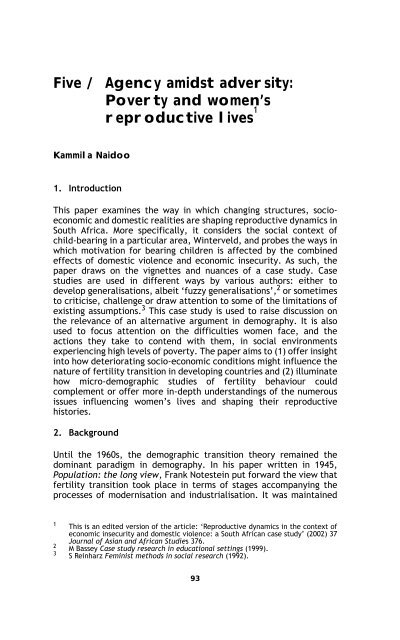Sex, Gender, Becoming - PULP
Sex, Gender, Becoming - PULP
Sex, Gender, Becoming - PULP
Create successful ePaper yourself
Turn your PDF publications into a flip-book with our unique Google optimized e-Paper software.
Five /<br />
Agency amidst adversity:<br />
Poverty and women’s<br />
1<br />
reproductive lives Kammila Naidoo<br />
1. Introduction<br />
This paper examines the way in which changing structures, socioeconomic<br />
and domestic realities are shaping reproductive dynamics in<br />
South Africa. More specifically, it considers the social context of<br />
child-bearing in a particular area, Winterveld, and probes the ways in<br />
which motivation for bearing children is affected by the combined<br />
effects of domestic violence and economic insecurity. As such, the<br />
paper draws on the vignettes and nuances of a case study. Case<br />
studies are used in different ways by various authors: either to<br />
develop generalisations, albeit ‘fuzzy generalisations’, 2 or sometimes<br />
to criticise, challenge or draw attention to some of the limitations of<br />
existing assumptions. 3 This case study is used to raise discussion on<br />
the relevance of an alternative argument in demography. It is also<br />
used to focus attention on the difficulties women face, and the<br />
actions they take to contend with them, in social environments<br />
experiencing high levels of poverty. The paper aims to (1) offer insight<br />
into how deteriorating socio-economic conditions might influence the<br />
nature of fertility transition in developing countries and (2) illuminate<br />
how micro-demographic studies of fertility behaviour could<br />
complement or offer more in-depth understandings of the numerous<br />
issues influencing women’s lives and shaping their reproductive<br />
histories.<br />
2. Background<br />
Until the 1960s, the demographic transition theory remained the<br />
dominant paradigm in demography. In his paper written in 1945,<br />
Population: the long view, Frank Notestein put forward the view that<br />
fertility transition took place in terms of stages accompanying the<br />
processes of modernisation and industrialisation. It was maintained<br />
1<br />
This is an edited version of the article: ‘Reproductive dynamics in the context of<br />
economic insecurity and domestic violence: a South African case study’ (2002) 37<br />
Journal of Asian and African Studies 376.<br />
2<br />
M Bassey Case study research in educational settings (1999).<br />
3 S Reinharz Feminist methods in social research (1992).<br />
93
















